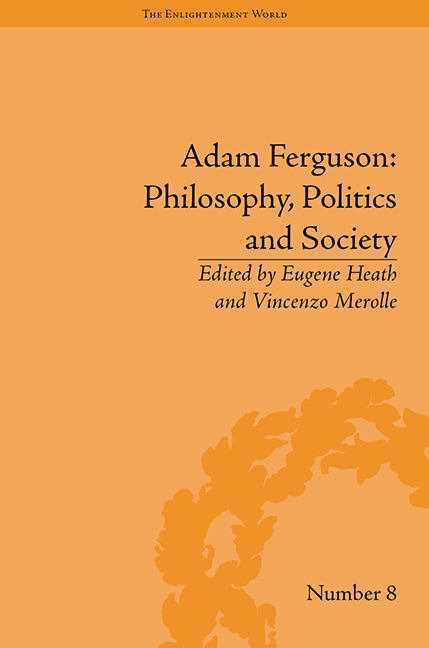Introduction
Summary
As a citizen Adam Ferguson (1723–1816) was an active participant in the political contests of the eighteenth century; as a philosopher he was engaged in debate with the greatest minds of his age; as a moralist, he sought to rekindle the fading flame of an ethos more ancient than modern; and as a scholar he forged new pathways in the study of society. These themes and others are the subject of this second volume devoted to scholarly reassessments of his life and thought. In the first volume (Adam Ferguson: History, Progress and Human Nature) contributors focused on Ferguson's life as scholar, teacher and citizen, assessed his contributions to history and historiography and reconsidered his conceptions of action and of providential progress. The essays in this volume address the background, nature and context of Ferguson's social and political thought. The first two papers gauge how Ferguson's comprehension of contemporary society reflects his Highland background. Subsequent essays turn to his relations with David Hume and Adam Smith, revisit the contours of Ferguson's political thought and plumb new understandings of his account of social development and his notion of unintended social order. Historians, philosophers and political scientists engage these topics with an eye to the breadth of Ferguson's work. Although the spotlight shines brightest on his most renowned book, An Essay on the History of Civil Society (1767), other works are illuminated, including his Institutes of Moral Philosophy (1792), Principles of Moral and Political Science (1769) and manuscript essays and correspondence. As with the first volume, the papers included in this second collection will be of interest to historians of ideas, scholars of the eighteenth century, philosophers and social and political theorists.
Ferguson's works display breadth, intelligence and seriousness of moral purpose. As a theorist of society, politics and morals, he begins with the fact that human beings are born in society. We are sociable creatures, blessed with a complex nature of sometimes countervailing motives. Affected by circumstance and history, individuals and societies undergo progress and improvement.
- Type
- Chapter
- Information
- Adam FergusonPhilosophy, Politics and Society, pp. 1 - 8Publisher: Pickering & ChattoFirst published in: 2014



